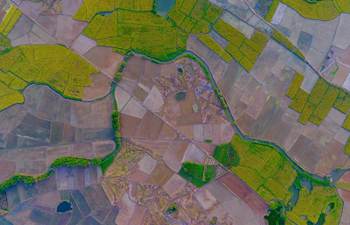SAN FRANCISCO, Aug. 8 (Xinhua) -- For most people, outside expert circles, there is no reason to believe that forest fires are good.
However, early results from a study by researchers at Oregon State University (OSU) suggest that moderate and severe forest fires could lead to greater abundance and diversity of wild bees.
The underpinnings behind the observation in the first year of the two-year project, to be presented at the annual conference of the Ecological Society of America (ESA) on August 10 in Portland, Oregon, a state in the U.S. Pacific Northwest, were conditions created by forest fires.
A team of field researchers, led by Jim Rivers, an OSU forest wildlife ecologist, began trapping bees at 43 sites burned by the 2013 Douglas Complex fire north of Grants Pass, which affected more than 24,000 acres of forests in southern Oregon. The sites ranged from places where fire severity was low to places where severity was moderate and high.
In low severity spots, where flames were confined to low-growing vegetation and failed to reach the canopy, according to Sara Galbraith, a post-doctoral researcher in the OSU College of Forestry who will present a paper at the ESA conference, there is not a lot of evidence of fire except for some blackened areas on some of the tree trunks. In comparison, at some of the high-severity fire sites, it is a completely open canopy.
There, at the high-severity fire sites, Galbraith saw a lot of flowering plants in the understory because the light limitation is gone. "It just looks completely different," she was quoted as saying in a news release.
Funded in part by the U.S. federal Bureau of Land Management, the researchers in the study attracted wild bees by reflecting ultra-violet light, which the insects mistook as a huge flower. And once the bees got inside, they were unable to fly out from the trap.
As there are more than 500 species of native bees in Oregon that are important pollinators of wild plants and crops, the researchers noted, the findings suggest that fires may promote bee populations that in turn may influence agricultural productivity and overall floral diversity.

















